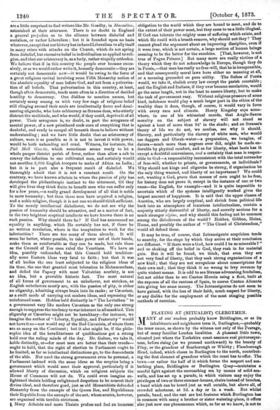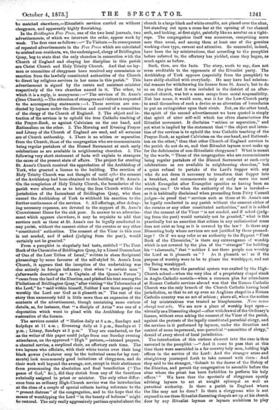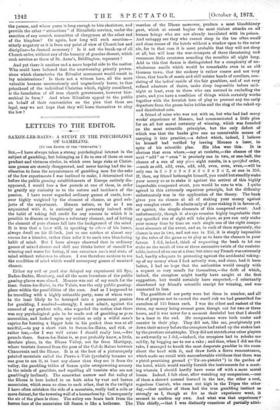PLAYING AT (RITUALIST) CLERGYMEN.
%T inhabitants of our 'readers probably know Bridlington, or as its J and neighbours term it, Burlington,—probably the truer name, as shown by the witness not only of the Peerage, but of many familiar Loudon localities. A pleasant little town, situated just where the Yorkshire coast assumes real picturesque- ness, before rising (as we proceed northward) to the beauty of Filey, or the grandeur of Scarborough or Whitby ; Flamborough Head, indeed, which closes in Burlington to the north, contribut- ing the first element of grandeur which the coast has to offer. The town—or rather the half of it which forms the seaport and sea- bathing place, Bridlington or Burlington Quay—maintains a manful fight against the encroaching sea by means of solid sea- walls, and has set up a parade, in which visitors may enjoy the privileges of two or three summer-houses, chairs instead of benches, a band which can be heard just as well outside, but above all, of crowded selectness, at 3d. a day or is. a week. But whilst parade, band, and the rest are but features which Burlington has in common with many a brother or sister watering-place, it offers also just now one phenomenon which, so far as we know, is not to
be matched elsewhere,—Ritualistic services carried on without clergymen, and apparently highly flourishing.
In the Bridlington Free Press, one of the two local journals, two advertisements, of which we intervert the order, appear week by
week. The first runs as follows :—" To Visitors.—In consequence
.of repeated advertisements in the Free Press which are calculated to mislead non-residents, we, the undersigned, clergy of Bridlington
Quay, beg to state that the only churches in connection with the Church of England and obeying her discipline in this parish are Christ Church and Holy Trinity Church. And that no lay- men or committee of clergymen have received any commission or sanction from the lawfully constituted authorities of the Church to direct lay religious services in her name in this parish." This advertisement is signed by the curate and assistant-minister respectively of the two churches named in it. The other, to which it is a reply, is anonymous :—" The services of St. Anne's
(Iron Church).—The attention of strangers and visitors is requested
to the accompanying statements :-1. These services are con- ducted by laymen under the direction and control of a committee of the clergy of the Church of England. 2. The object and in- tention of the services is to uphold the true Catholic teaching of the Prayer-Book, as against Calvinism on the one hand, and Rationalism on the other. 3. The Morning and Evening Prayer and Litany of the Church of England are used, and all sermons are of Church authorship. 4. There is no schism or separation from the Church, those of the congregation who are communicants being regular partakers of the Blessed Sacrament at such early celebrations as are available in neighbouring churches. 5. The following very short statement of facts will explain to strangers the cause of the present state of affairs. The project for erecting St. Anne's Church received the approbation of the Archbishop of York, who granted a licence to the building. The erection of
Holy Trinity Church was not thought of until after the consent of the Archbishop had been obtained to the building of St. Anne's.
On the completion of Holy Trinity Church, the boundaries of the parish were altered, so as to bring the Iron Church within the jurisdiction of the Incumbent of Bridlington Quay, who then caused the Archbishop of York to withhold his sanction to the further continuance of the services. 6. All offerings, after defray- ;log necessary expenses, are devoted to the support of St. Anne's Convalescent Home for the sick poor. In answer to an advertise- ment which appears elsewhere, it may be requisite to add that services such as those at St. Anne's can be legally conducted in any parish, without the consent either of the curates or any other -' constituted' authorities. The consent of the Vicar in this case is not needed, and if asked (judging from the past), would 'certainly not be granted."
From a pamphlet in singularly bad taste, entitled "The First (Book of the Chronicles of Bridlington Quay, by a Lineal Descendant -of One of the Lost Tribes of Israel," written in sham Scriptural phraseology by some favourer of the self-styled St. Anne's Iron Church, it appears that the inception of the undertaking was due entirely to foreign influence ; that when "a certain man" .(afterwards described as "A Captain-of the Queen's Forces -) "came from the land of the Eborites, and pitched his tent among the Philistines of Bridlington Quay," after visiting " the Tabernacles of the Lord," he "said within himself, Neither I nor these people can worship the Lord our God as it pleaseth us." The rest of the story thus nauseously told is little more than an expansion of the contents of the advertisement, though containing some curious details, as, for instance, that "a disciple of Arias" was one of a deputation which went to plead with the Archbishop for the restoration of the licence.
The services consist of "Matins daily at 8 a.m., Sundays and bolydays at 11 a.m.; Evensong daily at 5 p.m., Sundays at 7 p.m. ; Litany, Sundays at 3 p.m." They are conducted, so far as the writer of this paper could judge from one Sunday evening attendance, on the approved " High " pattern,—intoned prayers, a chanted service, a surpliced choir, an offertory each time. The two laymen who officiate, with their white tunics over their long black gowns (whatever may be the technical name for lay vest- ments) look uncommonly good imitations of clergymen, and do their work well beyond the average, nor, except in their abstinence from pronouncing the absolution and final benediction (" The peace of God," &c.), did they shrink from any of the functions rubrically assigned to priest or minister. The only other differ- ence from an ordinary High-Church service was the introduction at the close of a couple of special collects having reference to the "present distress" of the congregation, and to the hope that the means of worshipping the Lord "in the beauty of holiness" might be restored. The only really aggressively partisan symbol about the ,
church is a large black and white crucifix, not placed over the altar, but standing out upon a cross-bar at the opening of the chancel arch, and looking, at first sight, painfully like an acrobat on a tight- rope. The congregation itself was numerous, comprising more men than usual, and among them at least one of the genuine working-class type, earnest and attentive. So successful, indeed, have been the lay ministrations, that according to the pamphlet before referred to, the offertory has yielded, since they began, as much again as before.
Such, then, are the facts. The story, Booth to say, does not seem creditable to the opponents of the Ritualist party. The Archbishop of York appears (especially from the pamphlet) to have shilly-shallied with everybody. He may have had substan- tial reasons for withdrawing his licence from St. Anne's, but to do so on the plea that it was included in the district of an after- erected church, was but a mean escape from moral responsibility. Not less mean, it would seem, was it for the Low-Church party to avail themselves of such a device as an alteration of boundaries to put an extinguisher upon their rivals. But, on the other hand, the spirit of the second advertisement we have quoted is simply that spirit of utter self-will which too often characterises the Ritualist movement. It disclaims "schism or separation," and yet what is implied by the statement that "the object and inten- tion of the services is to uphold the true Catholic teaching of the Prayer-Book, as against Calvinism on the one hand, and Rational- ism on the other," than that other Church-of-England services in the parish do not do so, and that Ritualist laymen must make up for the deficiencies of non-Ritualistic clergymen ? What is meant by the words, "Those of the congregation who are communicants being regular partakers of the Blessed Sacrament at such early celebrations as are available in neighbouring churches," but a quiet refusal to partake of the Lord's Supper with any who do not deem it necessary to transform that Supper into a breakfast, and commemorate only at early morn the meal which Evangelist after Evangelist specifies as having been an evening one ? Or when the authority of the law is invoked— as it is habitually disclaimed when proceeding from Privy Council judges—in proof that "services such as those at St. Anne's can be legally conducted in any parish without the consent either of the curates or any other constituted authorities," and it is added that the consent of the Vicar "is not needed, and if asked (judg- ing from the past) would certainly not be granted," what is this practically but an assertion that schism in any ecclesiastical sense does not exist so long as it is covered by the law ? Is there any Dissenting body whose services are not justified by these proceed- ings ? Or if we may refer as an authority to the flippant "First Book of the Chronicles," is there any extravagance of worship which is not covered by the plea of the " stranger " for building his " tabernacle," that " neither I nor these people can worship the Lord as it pleaseth us " ? As it pleaseth us ! as if the purpose of worship were to be to please the worshipper, and not the Being worshipped.
Time was, when the parochial system was exalted by the High- Church school—when the very idea of a proprietary chapel stank in Anglo-Catholic nostrils—when a common plea for attendance at Roman Catholic services abroad was that the Roman Catholic Church was the only branch of the Church Catholic having local jurisdiction, so that to set up even an Anglican chapel in a Roman Catholic country was an act of schism ; above all, when the notion of lay ministrations was treated as blasphemous. 2V0t1.4 avons change tout cela. We see now a place of worship kept open—. virtually as a Dissenting chapel—after withdrawal of the Ordinary's licence, without even asking the consent of the Vicar of the parish, against the protests of the legally constituted parochial clergy, and the services in it performed by laymen, under the direction and control of some impersonal, non-parochial "committee of clergy," devoid of every shred of local jurisdiction.
'rile introduction of this curious element into the case is thus narrated in the pamphlet :—" And it came to pass that at this time there were assembled in a far country holy men, holding high offices in the service of the Lord : And the stranger arose and straightway journeyed forth to take counsel with them : And they said to the stranger, Submit to the decree of the Bishop of the Eborites, and permit thy congregation to assemble before the altar where the priest has been forbidden to perform his holy offices.'" We have thus the spectacle of clergymen openly advising laymen to set at naught episcopal as well as
parochial authority. Is there a parish in England where the like may not be done ? Is there a clergyman who is not exposed to see these Ritualist dissenting chapels set up at his church door by any Ritualist layman or laymen ambitions to play
the parson, and whose purse is long enough to hire choristers, and provide the other "attractions" of Ritualistic services, under the sanction of any scratch committee of clergymen at the other end of the kingdom? Or again, how long will such sanction— utterly nugatory as it is from any point of view of Church law and discipline—be deemed necessary ? Is it not the break-up of all Church order, without any of the honesty of genuine dissent, which such services as those of St. Anne's, Bridlington, represent ?
And yet there is another and a more hopeful side to the matter. Who could have believed that the overweening priestly preten- sions which characterise the Ritualist movement would result in lay ministrations ? Is there not a witness here, all the more valuable because unconsciously and ungraciously borne, to that priesthood of the individual Christian which, rightly considered, is the foundation of all true church government, however hier- archical in form ? And when Ritualists appeal to the public on behalf of their conventicles on the plea that these are legal, may we not hope that they will learn themselves to obey the law ?




































 Previous page
Previous page